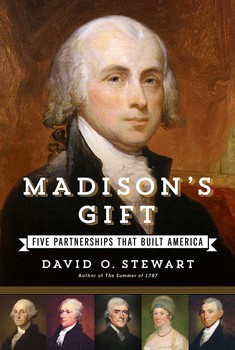David O. Stewart talks James Madison & What 3 Historical Figures He’d Want With Him on a Desert Island

by Megan Wessell
Megan blogs about books at A Bookish Affair.
When it comes to Founding Fathers, poor James Madison is often overlooked! Think about how many books have written about the likes of George Washington and Thomas Jefferson recently. Poor Madison has gotten the shaft! David O. Stewart’s latest offering, “Madison’s Gift: Five Partnerships That Built America,” shows just how accomplished Madison was and why he is well deserving of greater study.
I always love reading a book that can teach me something new and this book definitely let me see James Madison in a new light. This book is a thrilling look at some of Madison’s most important relationships and how they influenced him and changed the course of American history.
Compared to some of our other Founding Fathers, Madison does not seem to get very much written about him. What drew you to writing about him?
Two discordant facts drew me to Madison. First, as you note, he is relatively neglected among the historical figures who were present at the Founding. Yet his list of accomplishments is astonishing – really, greater than any contemporary other than George Washington. Check out this list: (i) In the 1780s, Madison was central to the campaign to have a Constitutional Convention to remake the crumbling American government; (ii) he was a pivotal figure at the Constitutional Convention; (iii) he co-wrote the Federalist Papers, the best political theory ever written by Americans; (iv) he led the campaign to get the Constitution ratified by the states; (v) he was George Washington’s principal adviser in the early days of the new government and was often called Washington’s “prime minister”; (vi) he was author and champion of the Bill of Rights; (vii) he co-founded America’s first political party; (viii) he was political strategist behind the Republican electoral victory of 1800, which Jefferson called a “revolution” in government; (ix) as Secretary of State, he directed the Louisiana Purchase, which doubled the size of the country; (x) he was America’s first wartime president, leading the nation through the War of 1812 without adopting measures that suppressed personal liberties; (xi) he may be the only two-term president who had a better second term than his first. We should study this guy!
I really liked how you had the book divided up by Madison’s partnerships with the likes of Thomas Jefferson, George Washington, Alexander Hamilton, James Monroe, and Dolley Madison. What made you decide to write about Madison’s partnerships?
The more I studied Madison, the more it came through that most of his great accomplishments came through partnerships with other talented leaders. Madison was comfortable with not being in the spotlight – he actually didn’t much care for it. As one longtime Madison friend noted, he was “ever mindful of what was due from him to others”: that’s not a dominant quality in most political leaders, who trend to the narcissism end of the personality spectrum. I decided that the whole notion of partnership was central to Madison’s personality and his career. He liked working with others and was adept at it. He was not a total “alpha male,” which makes him even more interesting at a time when American leaders are having a hard time working together. Many of his contemporaries were more charismatic (Washington, Jefferson) or simply noisier (Hamilton, Adams). Madison, it seems to me, was the fellow in the back room getting the real work done, not so often the one out front getting the credit.
Do you think there was a single partnership that was more important to Madison’s success than the others?
I suppose I could elevate three of the five. The Washington partnership gave him instant stature and credibility. Anyone trusted by Washington was presumptively worthy of the trust of others. He and Jefferson were so close to being soulmates, and so effective as political partners, that their collaboration was essential to Madison at a personal and professional level. And his partnership with Dolley stands as the one that grounded and enriched the second half of his life and made his political ascendance possible.
What was your favorite partnership to research and write about?
Definitely, the partnership with Dolley. This was my first attempt to study a female historical figure, and I enjoyed it tremendously. Some of that pleasure may be attributed to Dolley herself; she was an interesting and engaging figure. But some of my reaction was due to the different experiences of women during the early American period and their different ways of writing and talking about those experiences. I have largely studied male political figures who wrote and talked – with one eye on the historical record – mostly about public matters, rarely about their feelings. Dolley gushed about her feelings, about her beloved relatives and friends, about her annoying slaves, and about the world around her. I felt that I was looking through a new window. Sure, Dolley sometimes kept her own eye on history (notably to record how she saved the Gilbert Stuart portrait of Washington from British troops intent on burning the White House). Nevertheless, the experience made me even more frustrated by the thin historical record of women’s lives, and more sensitive to the importance of reclaiming it.
And now for a fun question: If you could choose any three historical figures to bring with you to a deserted island, who would you bring and why?
If I’m really going to be on a desert island, I would put a premium on amiability and conversational excellence. Napoleon need not apply. I would definitely crave high-spirited female company, which would place Dolley Madison high on any list. Ben Franklin would be a hoot. And maybe Leonardo da Vinci, assuming I could pick up some Italian. Leonardo might even design a machine to get us off the island. The downside of this lineup, of course, is that with Leonardo and Ben around, Dolley probably wouldn’t find me all that interesting.
 David O. Stewart is an award-winning author and the president of The Washington Independent Review of Books. He is the author of several acclaimed histories, including “The Summer of 1787: The Men Who Invented the Constitution” as well as “Impeached: The Trial of President Andrew Johnson and the Fight for Lincoln’s Legacy” and “American Emperor: Aaron Burr’s Challenge to Jefferson’s America.” Stewart has also written a novel, “The Lincoln Deception.” His newest book is “Madison’s Gift: Five Partnerships that Built America.”
David O. Stewart is an award-winning author and the president of The Washington Independent Review of Books. He is the author of several acclaimed histories, including “The Summer of 1787: The Men Who Invented the Constitution” as well as “Impeached: The Trial of President Andrew Johnson and the Fight for Lincoln’s Legacy” and “American Emperor: Aaron Burr’s Challenge to Jefferson’s America.” Stewart has also written a novel, “The Lincoln Deception.” His newest book is “Madison’s Gift: Five Partnerships that Built America.”


